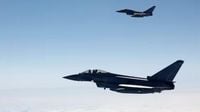Two Royal Air Force Typhoons soared into the night sky from RAF Coningsby in Lincolnshire last Friday, embarking on a mission that many observers see as a pivotal moment for the security of NATO’s eastern flank. In a move that both underscores and tests the resolve of the Western alliance, these British jets patrolled Polish airspace in response to what the UK government described as the most significant violation of NATO airspace by Russia since the full-scale invasion of Ukraine began in 2022, according to The Economic Times and multiple other outlets.
This operation, part of NATO’s Eastern Sentry initiative, was announced on Monday, September 15, 2025, by Defence Minister John Healey. The timing was no accident: the mission followed a recent incursion by Russian drones into Polish sovereign airspace—a “reckless and dangerous” act that Healey condemned in no uncertain terms. “RAF Typhoons have now flown their first air defence mission over Poland, sending a clear signal: NATO airspace will be defended,” Healey stated, as reported by India Today and Devdiscourse.
The mission itself unfolded with military precision. Two Typhoons, supported by an RAF Voyager air-to-air refueling aircraft, took off from eastern England late Friday night, September 19, 2025. Their objective: to patrol Polish skies, deter, and, if necessary, defend against aerial threats from Russia, including drones. By early Saturday morning, September 20, both jets had returned safely to the UK, their sortie completed without incident but brimming with symbolic weight.
According to The Economic Times, this was the “most significant violation” of NATO airspace by Russian President Vladimir Putin since his illegal full-scale war in Ukraine began. The UK government’s swift response was meant not just to reassure Poland and other eastern NATO members, but also to send a broader message to Moscow: the alliance takes the integrity of its airspace seriously, and its response will be both agile and resolute.
Chief of the Air Staff, Air Chief Marshal Harv Smyth, echoed this sentiment, highlighting the operational readiness and integration of British forces with NATO allies. “Our partnership with NATO has never been stronger. This sortie marks the RAF’s first operational mission on Eastern Sentry, reinforcing the UK’s steadfast commitment to NATO and its allies. We remain agile, integrated, and ready to project airpower at range,” Smyth said, as quoted by India Today and Devdiscourse.
The Eastern Sentry mission is not just a one-off gesture. Over the past 18 months, the RAF has deployed Typhoons to both Poland and Romania to help protect NATO airspace, a fact highlighted by The Economic Times. These modern jets, equipped with advanced sensors and infrared-guided ASRAAM missiles, are ideally suited to detect, monitor, and intercept potential aerial threats. More than 400 British personnel are set to directly support these missions, underscoring the scale and seriousness of the UK’s commitment.
The timing of the mission also carried historical resonance. This weekend marked the 85th anniversary of the Battle of Britain, a moment when Polish pilots famously played a crucial role in defending the UK from Nazi aggression. Now, as Defence Secretary Healey noted, “it is especially poignant that RAF pilots and crew are once again standing shoulder to shoulder with Poland in defence of our shared security—making us secure at home and strong abroad.”
But the story does not end with Poland. The British mission took place against a backdrop of heightened tensions across Eastern Europe. On the same Friday, September 19, 2025, NATO-member Estonia reported a 12-minute violation of its airspace by three Russian military jets—a move described by Estonian officials as “unprecedentedly brazen.” Russia, for its part, denied any wrongdoing, with its Defence Ministry insisting that its aircraft operated only over neutral waters. Nevertheless, Healey was quick to condemn what he called Russia’s “latest reckless and dangerous activity,” noting that it was the third violation of NATO airspace in recent days.
These repeated breaches have sparked concern and debate within the alliance. At a North Atlantic Council meeting last week, NATO allies expressed full solidarity with Poland after it requested consultations under Article 4 of the Washington Treaty. The message from Brussels was clear: the alliance stands united in the face of Russian provocations, regardless of Moscow’s denials.
Beyond the immediate military response, the UK’s actions have political and strategic implications. The government has pledged to increase defence spending to 2.6% of GDP by April 2027—the largest sustained boost since the end of the Cold War. This move is seen not only as a response to the evolving threat from Russia, but also as a signal to allies and critics alike. Former U.S. President Donald Trump has repeatedly criticized European nations for not spending enough on defence and relying too heavily on American protection. The UK’s commitment to higher spending is intended to show that Britain is ready and willing to shoulder its share of Europe’s security burden.
For the UK, this is about more than just deterrence. The government’s Plan for Change places national security at the heart of its agenda, with an unwavering commitment to NATO and Euro-Atlantic security. British Armed Forces continue to play a leading role in the alliance, from the Army’s presence in Estonia as part of NATO’s Forward Land Forces to the RAF’s enduring air policing missions across Europe.
As Defence Minister Healey put it, “I’m proud of the outstanding British pilots and air crew who took part in this successful operation to defend our Allies from reckless Russian aggression.” The sentiment was echoed by NATO partners, who see the UK’s actions as a powerful demonstration of alliance solidarity and operational capability.
For many in Poland and the broader region, the sight of British Typhoons patrolling their skies is a reassuring one. It is a visible reminder that, even in a time of uncertainty and heightened tension, NATO’s collective defence commitments remain ironclad. And as the alliance faces what Air Chief Marshal Smyth called “a new era of threat,” the resolve to defend every inch of NATO airspace has rarely felt more urgent—or more necessary.
With the memory of the Battle of Britain still fresh in the minds of many, the UK’s latest mission over Poland serves as both a tribute to past alliances and a clear-eyed response to today’s challenges. As events continue to unfold, one thing is certain: the skies over Eastern Europe are being watched—and defended—more closely than ever before.


